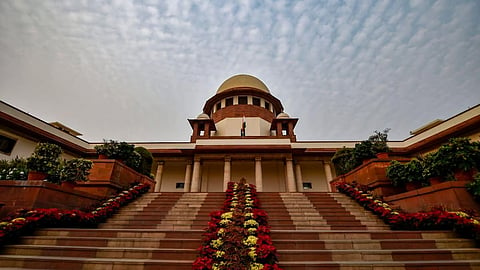

NEW DELHI: The Supreme Court on Monday directed the Central Bureau of Investigation (CBI) to file its reply within four weeks on the remission plea of Ravindra Pal, alias Dara Singh, who is serving a life sentence for the 1999 killings of Australian missionary Graham Stuart Staines and his two minor sons in Odisha's Keonjhar district.
A two-judge Bench, comprising Justice Hrishikesh Roy and Justice S.V.N. Bhatti, impleaded the CBI as the second respondent in the case following a request from Singh’s counsel.
Singh, though his lawyer requested the apex court to implead the CBI as one of the parties/ respondents in the case, saying that it was the investigating agency in the brutal murder case.
In his application, Singh sought a more liberal remission policy to enable his premature release, claiming he had spent over 24 years and 11 months in prison.
During the hearing, senior law officer of the Odisha government Shibashish Mishra requested an extension of two weeks to file the State’s reply.
Granting four weeks, the apex court instructed the State to submit details of the five committees that had examined Singh’s premature release. Mr. Mishra informed the court that the most recent report by these committees was submitted on February 20, 2023.
Dara Singh, a Bajrang Dal activist, moved the Supreme Court in July 2022 seeking remission of his sentence. His plea cited the release of A.G. Perarivalan, one of the convicts in the Rajiv Gandhi assassination case, arguing that the principle of reformative justice applied equally to him.
Advocate Vishnu Jain, representing Singh, submitted that Singh’s prolonged incarceration qualified him for release under the April 19, 2022, remission policy.
Quoting former Supreme Court Judge Justice V.R. Krishna Iyer’s words, “Every saint has a past, every sinner has a future,” Singh’s plea highlighted his repentance.
Singh in his plea said that he repented the offences as he was then "overwhelmed by distress at the barbaric deeds inflicted upon India by the Mughals and the British".
Singh, in in his plea, sought remission and alleged that the state authorities had failed to address several representations sent for his remission and premature release, jeopardising his right under Article 21 of the Constitution.
Justifying that he should be granted remission, as he has already undergone more than the qualified period of jail setence of 14 years and more, as stipulated in the remission policy of April 19, 2022.
"I am around 61 years age. I have never been released on parole," Singh, who originally hailed from Auraiya District in Uttar Pradesh, said in his plea making a water tight case of his remission. He also stated that when his mother passed away, he could not perform her last rites.
The petitioner, lodged in Keonjhar district jail, said that he acknowledged and deeply regretted the transgressions perpetrated more than two decades ago.
"In the fervor of youth, fueled by impassioned reactions to the brutal history of India, the petitioner's psyche momentarily lost restraint and it is imperative for the court to scrutinise not merely the actions but the underlying intent, noting that there was no personal animosity harboured towards any victim," Singh in his plea said.
Singh said that his actions arose out of the fervent desire to protect the nation rather than stemming from personal malice. He sought a "fair evaluation of the circumstances surrounding those tumultuous times," his plea added.
Citing various judgments involving similar circumstances and gravity of offences, he said that the court has granted release of life convicts on the grounds of good conduct inside the jail, the period of incarceration undergone, etc. So he should also be released on these grounds from jail.